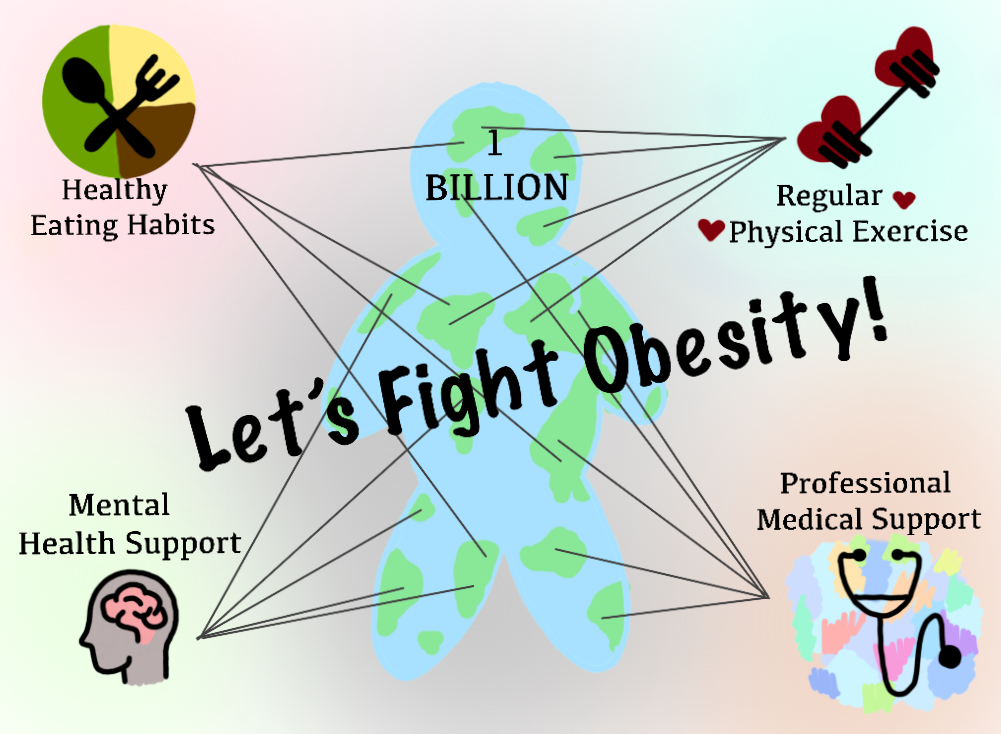Photo Credit: Nisa Notta
Why loving yourself does not entail encouraging unhealthy habits.
Stefanie Menezes, Lifestyle Editor
In a world of “body positivity” campaigns, broaching the topic of the obesity crisis is a sensitive matter, and for good reason. The current movement has its roots in the 1969 “Fat Acceptance” campaign, which spoke out against the mistreatment of plus-sized individuals, followed by the 1973 “Fat Liberation” campaign, which condemned this discrimination while spreading awareness of negative attitudes perpetuated by the diet industry and other similar institutions. However, many believe that modern society has gone too far with this movement, leading to the current global obesity crisis.
From 1990 to 2022, the global percentage of obese adults (having a BMI over 30) rose from 7% to 16%; and in children and adolescents between the ages of 5 and 19, the number quadrupled from 2% to 8%. Obesity, which is linked to the world’s leading causes of early death — heart disease, stroke, diabetes, and cancer — was once considered a problem of the rich; but in 2024, it was discovered that 78% of obesity-related deaths occur in low and middle-income countries. In fact, every region in the world except Southeast Asia has more individuals that are obese than underweight.
While many health experts are quick to condemn positive attitudes towards obesity as the “glorification” of an illness, it is important to consider that operating in either extreme is detrimental to the health of the individual. Several recent studies have found that body dissatisfaction is closely linked to depression, low self-esteem, and the use of certain performance-enhancing substances. In turn, having a negative body image increases an individual’s risk of mental health conditions — including eating disorders, which come with their own host of life-threatening health risks. The findings of a 2014 study even connect weight-based stigma with continued weight gain and physical symptoms.
Another notable factor is that in Western countries, the 20th century saw a rise in the availability of high-calorie and highly processed foods, larger portion sizes, and an increase in sedentary lifestyles. In lower-income countries, the Western problem of unhealthy food being more affordable and accessible than healthy food is exacerbated by rapid economic development and population growth. Outside these causes, obesity is not always due to lifestyle choices, and instead is the result or symptom of a pre-existing health condition.
For many individuals across the world, the challenge is not as simple as eating healthier foods and exercising more often; and unfortunately, the perils of continuing with an unhealthy lifestyle are more dangerous than social media proponents of body positivity will openly share with their followers. The solution to these issues will likely look different on an individual scale than on a societal scale, but ironically, the answer to the crisis in Western countries may be found in the core message of the “body positivity” movement: focus on health, not weight. Obesity is dangerous because of the dangers it poses to an individual’s health, not because of their physical appearance. Overconsumption of nutritionally deficient food and lack of physical activity is detrimental to an individual’s overall health. Treating all bodies as equally aesthetically acceptable does not entail encouraging unhealthy habits, whether these habits lead to obesity or emaciation. This is all to say, health is holistic, and to love oneself is to make healthy choices.




